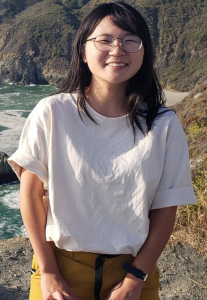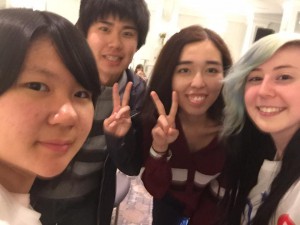Q&A with TOMODACHI Program Participants and TOMODACHI Alumni: Tomoyo Aizawa

Tomoyo Aizawa is an alumna of the TOMODACHI Daiwa House Student Leadership Conference III in 2016. Born and raised in Japan, Tomoyo currently lives in California as the Chief Marketing Officer (CMO) at Unicast Robotics Inc. where she provides services to Japanese and American businesses by developing robots. She is also a volunteer at the Orange County Japanese American Association (OCJAA) in Orange County, California, where she works on a community magazine for Japanese Americans. She was a participant of the U.S.-Japan Council Toshizo Watanabe Study Abroad Scholarship Program for the 2017-2018 academic year, which enabled her to study at Appalachian State University in North Carolina. She majored in Global Studies and minored in Computer Science. As a student, she interned at Unicast Robotics Inc., a Japanese company, for three months. During her internship, she participated in a program sponsored by JETRO (Japan External Trade Organization) to help Japanese companies expand their business in the U.S. This experience allowed her to join the U.S. expansion team following her graduation.
This interview was conducted virtually on May 6, 2021 by Maho Suzuki, TOMODACHI Alumni Intern (2021) based out of Tokyo, Japan.
Q1: What was the most memorable aspect of the TOMODACHI Daiwa House Student Leadership Conference?
There were many participants in the program who were highly motivated and had a clear idea of what they wanted to do. In addition, I was struck by the fact that many of the participants were experienced and had clear future goals, even though we were the same age. In fact, a fellow participant from the same university was interested in U.S.-Japan exchange when she joined the program and is currently working in the tourism industry in Japan. Knowing that a participant like her, who has continued to pursue a goal that she set her sights on at the time of the program, motivates me to do my best as well.

With the participants of the TOMODACHI Daiwa House Student Leadership Conference
(Tomoyo is on the left)
Q2: What changes have you seen in yourself as a result of participating in the program?
I was inspired by the participants I met through the program, which encouraged me to take on new challenges. I pushed myself out of my comfort zone by becoming the vice president of the Japanese Culture Club at the university where I studied abroad and participated in an internship at Unicast Robotics, Inc. Working in the Japanese Culture Club taught me how to work effectively within a cross-cultural team. I learned how to clearly communicate the task at hand, identify the individual in charge, and maintain a positive attitude in an environment where the majority of the club members were Americans. I also worked as an intern at Unicast Robotics, Inc. where I was mainly in charge of revising the website and working as an interpreter for a JETRO-sponsored program to help companies enter the US market. This was my first work experience outside of a part-time job, so I remember how fresh everything was. Participating in the program allowed me to overcome obstacles and begin to believe that I could push myself outside of my comfort zone.
Moreover, I feel that my experiences at Appalachian State University as a Toshizo Watanabe Study Abroad Scholarship recipient had a direct impact on my current career. At university, I was amazed to see how IT was being so smoothly integrated into education and how it was being utilized in the field, which piqued my interest in the field of technology. Since it had helped me in my study abroad experience, I decided to major in Global Studies with a minor in Computer Science because I thought that technology could be useful in international education, which I was originally interested in. When it was time to find a job, I decided to pursue technology, although I was also interested in the field of international education.
Q3: Where do you see the future of U.S.-Japan relations going in terms of technology and robotics given your current position?
I believe that cooperation in the area of technology between Japan and the United States will ultimately strengthen the relationship between the two countries. In my current job, I have the opportunity to work with people from both Japan and the U.S., and there are differences in the technology and requirements of each robot produced by each country. For example, when it comes to robots for customer service, the Japanese focus on hospitality, while the Americans focus on cost reduction and convenience. I believe that by focusing on areas that are prioritized by both parties and exercising effective cooperation, we will be able to create services and technology that contribute to a better society.
In addition, I am currently involved in editing the Orange Network, a community magazine for Orange County Japanese American Association in Orange County, California. I conduct interviews, write copy, and coordinate content with clients who want to advertise in the magazine. The information I provide helps readers lead better lives in Orange County. The information, which I provide in Japanese, ranges from assistance finding caregiving services and health insurance, to information about walking trails and local restaurants. My experience living in the U.S. showed me that the Japanese American community in California was established and continues to be maintained through the continuous efforts of that same community. For example, among foreign companies operating in California, Japan ranks first in terms of number of employees, number of companies, and total wages in a country-by-country comparison. JETRO and other organizations continue to provide support to Japanese companies to make it easier for them to integrate themselves into the existing market. As a result of my experiences, I have learned that the Japanese American community is extremely beneficial to the region and therefore directly impacts the stability of Japan-U.S. relations.
Q4: The evolution of robot technology is currently attracting a lot of attention. There are positive aspects, but there are also negative aspects, such as the fact that robots will take our jobs in the future. How do you think humans and robots can coexist?
Technology has evolved remarkably over the last decade, but I don’t think it has led to the loss of any jobs. I think more jobs are being developed and increasing in popularity. Furthermore, even with the advancement of technology, there are still inconveniences in the world.
My company is currently developing a robot that supports caregivers by providing assistance with recreational activities. The robot can lead recreational activities in place of staff. For example, the robot can play exercise programs on the radio and project an image of an instructor exercising on a monitor simultaneously while 20 elderly people in wheelchairs slowly move their bodies in time to the music. This reduces the workload of the staff and allows them to devote more time and energy to the tasks that only they can complete.
Robots are just a supplementary tool to help people compensate for what they cannot do. Therefore, I believe that cooperation between robots and humans will allow people to spend more time doing things only they can do, which will lead to solving social problems such as poverty and the labor shortage.
Q5: What does TOMODACHI mean to you?
For me, TOMODACHI is a reminder to stay motivated and keep my goals in mind. When I see what other alumni are doing through TOMODACHI’s media and monthly newsletters, it makes me feel more positive and motivated to do my best.
Q6: What are your future goals?
Software and technology have helped me tremendously in overcoming new challenges. I have experienced firsthand how much software helped me during my time abroad. I utilized software to help me correct my grammar when I wrote reports and communicate with people from other countries as well. These experiences made me aware of just how much technology and software can help other people; for that reason, I would like to continue to remain involved with technology in the future.
Q7: Do you have any advice for students and young professionals?
I think it is good to try a lot of things without pushing yourself too far beyond your limits. The TOMODACHI community is a very supportive environment where it is easy to challenge yourself. I would encourage you to take advantage of this environment and try many things.


